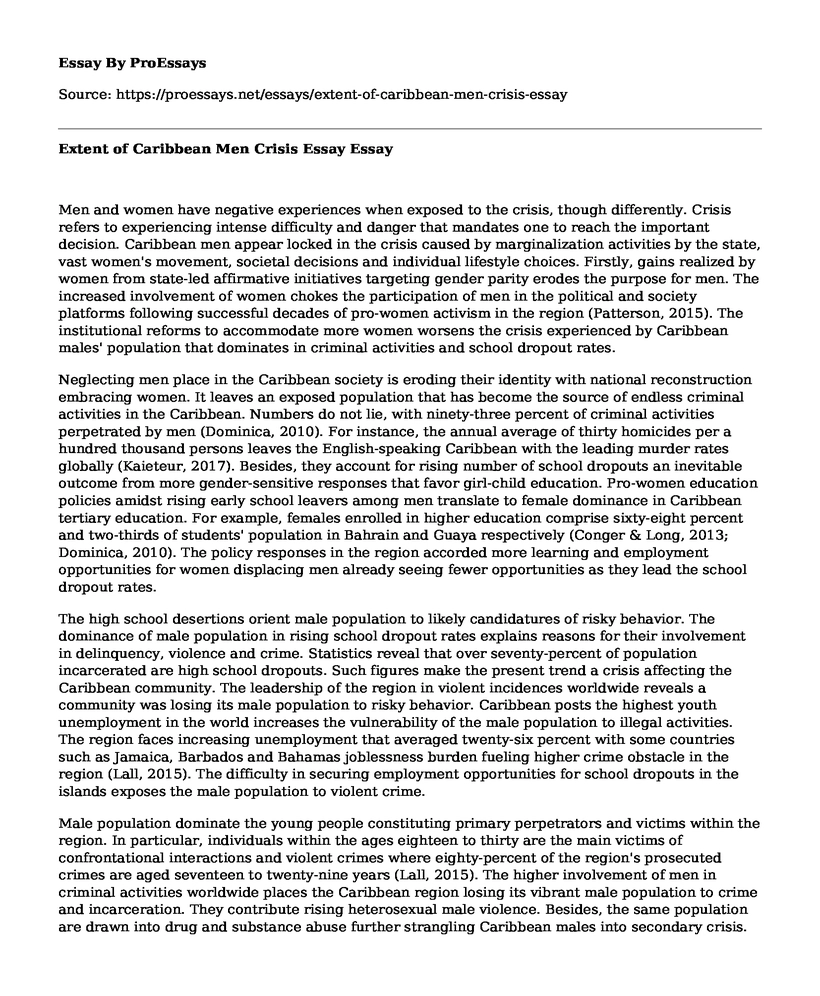Men and women have negative experiences when exposed to the crisis, though differently. Crisis refers to experiencing intense difficulty and danger that mandates one to reach the important decision. Caribbean men appear locked in the crisis caused by marginalization activities by the state, vast women's movement, societal decisions and individual lifestyle choices. Firstly, gains realized by women from state-led affirmative initiatives targeting gender parity erodes the purpose for men. The increased involvement of women chokes the participation of men in the political and society platforms following successful decades of pro-women activism in the region (Patterson, 2015). The institutional reforms to accommodate more women worsens the crisis experienced by Caribbean males' population that dominates in criminal activities and school dropout rates.
Neglecting men place in the Caribbean society is eroding their identity with national reconstruction embracing women. It leaves an exposed population that has become the source of endless criminal activities in the Caribbean. Numbers do not lie, with ninety-three percent of criminal activities perpetrated by men (Dominica, 2010). For instance, the annual average of thirty homicides per a hundred thousand persons leaves the English-speaking Caribbean with the leading murder rates globally (Kaieteur, 2017). Besides, they account for rising number of school dropouts an inevitable outcome from more gender-sensitive responses that favor girl-child education. Pro-women education policies amidst rising early school leavers among men translate to female dominance in Caribbean tertiary education. For example, females enrolled in higher education comprise sixty-eight percent and two-thirds of students' population in Bahrain and Guaya respectively (Conger & Long, 2013; Dominica, 2010). The policy responses in the region accorded more learning and employment opportunities for women displacing men already seeing fewer opportunities as they lead the school dropout rates.
The high school desertions orient male population to likely candidatures of risky behavior. The dominance of male population in rising school dropout rates explains reasons for their involvement in delinquency, violence and crime. Statistics reveal that over seventy-percent of population incarcerated are high school dropouts. Such figures make the present trend a crisis affecting the Caribbean community. The leadership of the region in violent incidences worldwide reveals a community was losing its male population to risky behavior. Caribbean posts the highest youth unemployment in the world increases the vulnerability of the male population to illegal activities. The region faces increasing unemployment that averaged twenty-six percent with some countries such as Jamaica, Barbados and Bahamas joblessness burden fueling higher crime obstacle in the region (Lall, 2015). The difficulty in securing employment opportunities for school dropouts in the islands exposes the male population to violent crime.
Male population dominate the young people constituting primary perpetrators and victims within the region. In particular, individuals within the ages eighteen to thirty are the main victims of confrontational interactions and violent crimes where eighty-percent of the region's prosecuted crimes are aged seventeen to twenty-nine years (Lall, 2015). The higher involvement of men in criminal activities worldwide places the Caribbean region losing its vibrant male population to crime and incarceration. They contribute rising heterosexual male violence. Besides, the same population are drawn into drug and substance abuse further strangling Caribbean males into secondary crisis.
The prevalence of broken homes, single parenting mothers, rising homicide and domestic abuse committed by males reveals an entrenched crisis. The situation shows eroded manhood identity that ought to make a difference in the Caribbean society. Similarly, declining post-secondary enrollment of men affirms a society was losing its protector and cultivator in risky behavior converting them into abusers (Kaieteur, 2017). Neglecting men creates opportunities for vices to continue characterizing the Caribbean society. The crisis should re-awaken the regional activism to empower men and confront challenges robbing the Caribbean its nation builders.
References
Conger, D., & Long, M. C. (2013, March 02). Women students dominating in many countries. University World News, 261. Retrieved March 22, 2018, from http://www.universityworldnews.com/article.php?story=2013022612105131
Dominica. (2010). Caribbean facing male crisis, says Bahamian religious official. Dominica News Online. Retrieved March 22, 2018, from http://dominicanewsonline.com/news/homepage/news/regional/caribbean-facing-male-crisis-says-bahamian-religious-official/
Kaieteur. (2017, June 11). Crime and Drugs in the Caribbean. Kaieteur News. Retrieved March 22, 2018, from https://www.kaieteurnewsonline.com/2017/06/11/crime-and-drugs-in-the-caribbean/
Lall, T. (2015, February 10). School dropout rates in Caribbean up 20% - IDB. Retrieved March 22, 2018, from https://www.kaieteurnewsonline.com/2015/02/10/school-dropout-rates-in-caribbean-up-20-idb/
Patterson, O. (2015). The Cultural Matrix: Understanding Black Youth. Harvard University Press.
Cite this page
Extent of Caribbean Men Crisis Essay. (2022, Apr 04). Retrieved from https://proessays.net/essays/extent-of-caribbean-men-crisis-essay
If you are the original author of this essay and no longer wish to have it published on the ProEssays website, please click below to request its removal:
- Sociology Essay Example - Gender Stereotypes and Culture
- My First Date Essay Sample
- The False Comfort of Securing Schools - Article Analysis Essay
- Role of Communication Skill in the Health Care Sector - Essay Sample
- Communication Strategy of Nike Inc Paper Example
- Essay on Face Negotiation: Ting-Toomey Theory for Conflict Resolution
- Paper Example on 5 Steps to Effectively Use CR in Organizations







